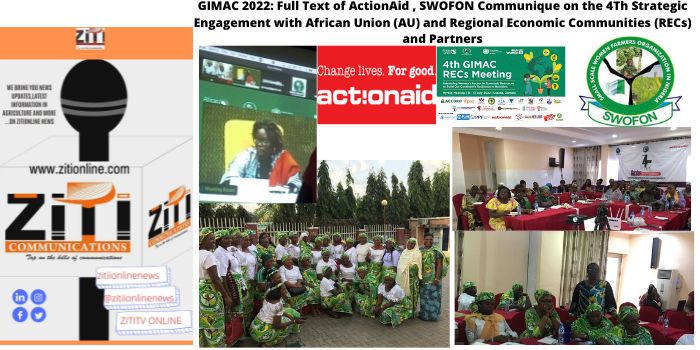By Queen Kunde
ActionAid International and ActionAid Nigeria supported Small Holder Women Farmers under the platform of Small-scale Women Farmers Organization in Nigeria (SWOFON) to participate in the 4Th Strategic Engagement with African Union (AU) and Regional Economic Communities (RECs) and Partners on the AU Theme of the Year 2022. The theme chosen for the year 2022 echoes legal instruments of the AU dedicated to tackling malnutrition:
- The Africa Health Strategy 2016 – 2030; The Africa Regional Nutrition Strategy 2015 – 2025 (ARNS).
- The Declaration on Nutrition Security for Inclusive Economic Growth and Sustainable Development in Africa.
- The Resolution on the Establishment of an OAU Inter- African Centre for Food Science, Technology and Nutrition.
- the African Union Continental Scorecard for Nutrition.
AU adopted these instruments to amplify, streamline and connote nutrition as a major pillar to advancing the continent’s human capital as a guarantee to ensuring improved lives for individuals, higher earnings and improved incomes for countries and the ultimate realization of Africa’s socio-economic development.
The Hybrid event took place physically in Lusaka, Zambia while SWOFON joined virtually on 11th and 12th July 2022 at Georgetown Hotel, Abuja.
The meeting in Nigeria brought together a total number of 45 participants consisting of small holder women farmers from the 36 states and FCT, media, ActionAid International/Nigeria and SWOFON Secretariat.
COMMENDATIONS
The meeting recognises and commend the consistent support of ActionAid International and ActionAid Nigeria for small scale women farmer organization in Nigeria (SWOFON) to participate in the 4th GIMAC summit
We also commend GIMAC for the theme of this year 2022 ‘’Advancing Women’s Access to Economic Resources to Build our Continents Resilience in Nutrition” as it speaks to the issues and challenges faced by smallholder women farmers.
KEY OBSERVATIONS
We observed that:
- Access to and control of land/land resources is limited to smallholder women farmers in Nigeria.
- Women have limited access to information Technology on achieving food security and nutrition.
- Limited access to finances and credit facilities by smallholder women farmers, hinders their economic growth.
- Consistent lack of implementation of government agriculture policies have negatively impacted the productivity and livelihoods of women farmers.
- Time poverty has continued to impact negatively on women farmers.
- The main aim of the school feeding programme is to increase school enrolment & improve the nutritional and health status of primary school children, boost the income of farmers, and provide empowerment opportunities for women farmers. However, this is not what is currently on ground in most areas, as middlemen (aggregators) are used and not necessarily real farmers.
- In Nigeria, smallholder women farmers suffer multiple taxation, yet they don’t benefit from the taxes generated.
- The high rate of insecurity with exacerbation of kidnap, banditry and effects of climate change is impeding on the productivity of smallholder women farmers to produce food adequately.
- Government has continued to promote smart agriculture where the use of harmful chemicals, pesticides and inorganic fertilizer is encouraged while Agroecology which will help to protect, restore, and improve agriculture and food systems in the face of climate shocks and stressors do not get the needed attention from government.
- Processed farm products are not traceable to the farmers/producers because of the activities of middlemen.
KEY RECOMMENDATIONS
- Given the importance of the theme ‘Advancing Women’s Access to Economic Resources to build our Continents Resilience in Nutrition”, we recommend the retention of the theme for at least 2 to 3 years to ensure attainment of the theme and achieve the desired results.
- Government should prioritize women land rights where it allows women to have access and control over land resources for sustainable economic development.
- Public investment in agriculture should be scaled up in specific areas of, Access to Credit, finances and grants for Women and young people in Agriculture.
- Government should create agricultural policies based on adequate needs assessment and commit to implementing those policies. Provision of gender friendly agricultural equipment and inputs should be prioritized.
- Appropriate supervision of school feeding program needs to be conducted regularly to ensure that the target beneficiaries are reached, and the objective of the program is sustained.
- As much as we encourage legitimate payment of taxes, we recommend that multiple taxes should be stopped, and government should ensure that taxes generated are used for projects that are beneficial to smallholder women farmers
- We recommend the development and awareness creation of indigenous technologies that promote agroecology towards sustainable agriculture.
- AU and member states need to accelerate climate justice as a continental and international priority – as climate change will drive 122 million more people into poverty by 2030 especially women and children.
- The need to optimize indigenous seeds and work in diversity to produce what we need as a nation to achieve food sovereignty and nutrition.
- We recommend a tracking mechanism that will measure, evaluate, and track implementation of previous GIMAC recommendations.
Endorsed By
- Small Scale Women Farmers Organisation in Nigeria (SWOFON, National)
- SWOFON Abia
- Adamawa
- SWOFON Anambra
- SWOFON Bauchi State
- SWOFON Bayelsa State
- SWOFON Benue State
- SWOFON Borno State
- SWOFON Cross River State
- SWOFON Delta State
- SWOFON Ebonyi State
- SWOFON Edo State
- SWOFON Ekiti State
- SWOFON Enugu State
- SWOFON Gombe State
- SWOFON Imo State
- SWOFON Kaduna State
- SWOFON Kano State
- SWOFON Katsina State
- SWOFON Kogi State
- SWOFON Kwara State
- SWOFON Lagos State
- SWOFON Nasarawa State
- SWOFON Niger State
- SWOFON Ogun State
- SWOFON Ondo State
- SWOFON Osun State
- SWOFON Oyo State
- SWOFON Plateau State
- SWOFON Rivers State
- SWOFON Taraba State
- SWOFON Yobe State
- SWOFON FCT
- ZITI Communications, ZITI Newspaper Taraba
